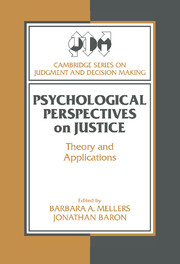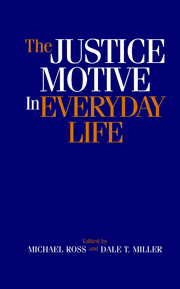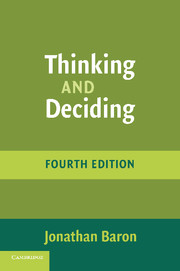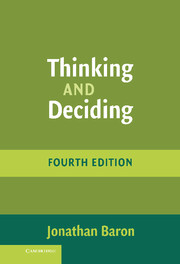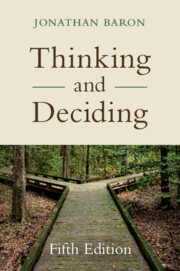Psychological Perspectives on Justice
Theory and Applications
$51.99 ( ) USD
Part of Cambridge Series on Judgment and Decision Making
- Editors:
- Barbara A. Mellers, University of California, Berkeley
- Jonathan Baron, University of Pennsylvania
- Date Published: April 2011
- availability: This ISBN is for an eBook version which is distributed on our behalf by a third party.
- format: Adobe eBook Reader
- isbn: 9780511512308
Find out more about Cambridge eBooks
$
51.99 USD
( )
Adobe eBook Reader
Other available formats:
Paperback, Hardback
Looking for an examination copy?
This title is not currently available for examination. However, if you are interested in the title for your course we can consider offering an examination copy. To register your interest please contact [email protected] providing details of the course you are teaching.
-
Justice, equity, and fairness are central concerns of everyday life. We frequently assess the fairness of individual acts, social programs, and institutional policies. This book explores how distributions of costs and benefits determine our intuitions about fairness. Some chapters examine the extent to which individual behavior deviates from normative theories of justice. This comparison requires an answer to the question of how fair distributions of resources or burdens should be made. Competing theories, such as utilitarianism and economic efficiency, are discussed. Other chapters investigate various rules and heuristics that people use to make fair distributions, the motivation for people to conform to rules of fairness even when they conflict with self-interest, differences between liberals and conservatives in their views about justice, rules that societies actually use to distribute or allocate critical or scarce resources, and implications for public policy. This mixture of theoretical and applied perspectives provides a balanced look at the psychological underpinnings of justice.
Read more- Jonathan Baron is very well known in his field
- Includes a contribution from the distinguished Jon Elster
Reviews & endorsements
"The present tightly edited volume provides innovative and rigorous additions to this growing body of theoretical and empirical work....although the present volume clearly illustrates the usefulness of a behavioral decision theory in the study of justice, its greatest contribution lies in demonstrating how social goals and strategies, such as the pursuit of justice and fairness influence judgments and decisions about the allocation of valued resources." Terry L. Boles and Charles G. McClintock, Contemporary Psychology
See more reviews"This edited volume is a splendid introduction to an important set of psychological studies in normative reasoning....These studies, and some of their implications, should indeed be grist for an ethicist's preferred theory of moral behavior." Ethics
Customer reviews
Not yet reviewed
Be the first to review
Review was not posted due to profanity
×Product details
- Date Published: April 2011
- format: Adobe eBook Reader
- isbn: 9780511512308
- availability: This ISBN is for an eBook version which is distributed on our behalf by a third party.
Table of Contents
1. Introductory remarks
Part I. Psychological Perspectives:
2. Equality as a decision heuristic David Messick
3. Two insights occasioned by attempts to pin down the equity formula Richard Harris
4. Judgments of justice Maya Bar-Hillel and Menahem Yaari
Part II. Economic Perspectives:
5. Justice in organised groups: comparing the self-interest and social identity perspectives Tom Tyler and Robyn Dawes
6. Heuristics and biases in equity judgments: a utilitarian approach Jonathan Baron
7. Tradeoffs in fairness and preference judgments Lisa Ordoñez and Barbara Mellers
8. Information, fairness, and efficiency in bargaining Colin Camerer and George Loewenstein
Part III. Variations in Perspectives of Justice:
9. The unfolding of justice: a developmental perspective on reward allocations Colleen Moore, Sheri E. Hembree, and Robert D. Enright
10. Of Ants and Grasshoppers: the political psychology of allocating scarce resources Linda Skitka and Philip E. Tetlock
11. Liberal and conservative approaches to justice: conflicting psychopolitical perspectives Philip E. Tetlock and Gregory Mitchell
Part IV. Policy Perspectives: Justice and the allocation of scarce resources Jon Elster
12. Models of equity in public risk Rakesh Sarin
13. Fairness of distributions of risks with applications to Antarctica Ivy Broder and Robin Keller
Part V: Postscript.
Sorry, this resource is locked
Please register or sign in to request access. If you are having problems accessing these resources please email [email protected]
Register Sign in» Proceed
You are now leaving the Cambridge University Press website. Your eBook purchase and download will be completed by our partner www.ebooks.com. Please see the permission section of the www.ebooks.com catalogue page for details of the print & copy limits on our eBooks.
Continue ×Are you sure you want to delete your account?
This cannot be undone.
Thank you for your feedback which will help us improve our service.
If you requested a response, we will make sure to get back to you shortly.
×
